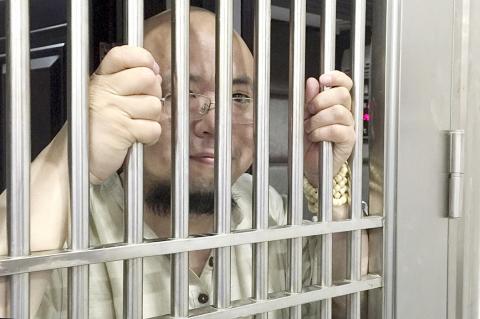China yesterday sentenced an activist known by the online pseudonym “Super Vulgar Butcher” to eight years in prison, one of the harshest punishments meted out to the group of lawyers and activists swept up in a major crackdown on civil society two years ago.
The punishment handed to Wu Gan (吳淦), who refused to plead guilty to charges of “subverting state power,” was intended as an unmistakable signal to anyone who would dare to challenge the state’s authority, his lawyer said.
Wu was taken into custody in May 2015 just weeks before authorities unleashed a ruthless campaign later dubbed the “709” crackdown, rounding up more than 200 people involved in activities considered sensitive by the Chinese Communist Party.

Photo: AP
The outspoken social media figure had attracted authorities’ attention with performance art and caustic commentary on Chinese society and politics that he published online.
A court in Tianjin said Wu was “dissatisfied with the current system of governance, and that gradually produced thoughts of subverting state power.”
By “hyping up hot incidents ... [Wu] attacked the national system that is the basis for state authority and the constitution,” it said.
Wu also “spread fake information” and “insulted others online,” the statement said.
The prominent activist became the subject of the state’s ire for using his larger-than-life online persona to draw public attention to human rights cases.
He called himself “butcher” because he saw himself as taking the fight to the authorities, promising to “slaughter the pigs.”
He later added “super vulgar” to his handle in response to complaints about his use of crude language to make his case.
His bold approach to seeking justice for those he saw as wronged by the government attracted praise from rights defenders, but was unpopular with the authorities, who saw him as a thorn in their side.
He was “a representative figure in leading actions to support other human rights defenders and significant human rights cases outside court,” said Patrick Poon (潘嘉偉), a China researcher at Amnesty International.
Wu’s lawyer, Yan Xin (燕薪), said the sentence was aimed at setting “an example so other activists will say they are guilty when accused of crimes against the state.”
“It’s clear [Wu] was sentenced so harshly because he refused to plead guilty,” he said.
The government’s message to dissidents was highlighted by a very different sentence passed down on the same day for another figure who was also caught up in the “709” crackdown.
A court in Changsha exempted former human rights lawyer Xie Yang (謝陽) from serving a sentence after he pleaded guilty to “inciting subversion of state power.”
He had worked on numerous politically sensitive cases, such as defending mainland supporters of Hong Kong democracy activists.
Xie was released on bail in May after what critics described as a show trial.
Xie had previously claimed that police used “sleep deprivation, long interrogations, beatings, death threats, humiliations” on him, allegations that became the focus of a rare letter by a number of Western embassies in Beijing directly criticizing the government’s handling of the case.
However, he yesterday denied he had been tortured, according to a video on the court’s official social media account.

The CIA has a message for Chinese government officials worried about their place in Chinese President Xi Jinping’s (習近平) government: Come work with us. The agency released two Mandarin-language videos on social media on Thursday inviting disgruntled officials to contact the CIA. The recruitment videos posted on YouTube and X racked up more than 5 million views combined in their first day. The outreach comes as CIA Director John Ratcliffe has vowed to boost the agency’s use of intelligence from human sources and its focus on China, which has recently targeted US officials with its own espionage operations. The videos are “aimed at

STEADFAST FRIEND: The bills encourage increased Taiwan-US engagement and address China’s distortion of UN Resolution 2758 to isolate Taiwan internationally The Presidential Office yesterday thanked the US House of Representatives for unanimously passing two Taiwan-related bills highlighting its solid support for Taiwan’s democracy and global participation, and for deepening bilateral relations. One of the bills, the Taiwan Assurance Implementation Act, requires the US Department of State to periodically review its guidelines for engagement with Taiwan, and report to the US Congress on the guidelines and plans to lift self-imposed limitations on US-Taiwan engagement. The other bill is the Taiwan International Solidarity Act, which clarifies that UN Resolution 2758 does not address the issue of the representation of Taiwan or its people in

US Indo-Pacific Commander Admiral Samuel Paparo on Friday expressed concern over the rate at which China is diversifying its military exercises, the Financial Times (FT) reported on Saturday. “The rates of change on the depth and breadth of their exercises is the one non-linear effect that I’ve seen in the last year that wakes me up at night or keeps me up at night,” Paparo was quoted by FT as saying while attending the annual Sedona Forum at the McCain Institute in Arizona. Paparo also expressed concern over the speed with which China was expanding its military. While the US

SHIFT: Taiwan’s better-than-expected first-quarter GDP and signs of weakness in the US have driven global capital back to emerging markets, the central bank head said The central bank yesterday blamed market speculation for the steep rise in the local currency, and urged exporters and financial institutions to stay calm and stop panic sell-offs to avoid hurting their own profitability. The nation’s top monetary policymaker said that it would step in, if necessary, to maintain order and stability in the foreign exchange market. The remarks came as the NT dollar yesterday closed up NT$0.919 to NT$30.145 against the US dollar in Taipei trading, after rising as high as NT$29.59 in intraday trading. The local currency has surged 5.85 percent against the greenback over the past two sessions, central